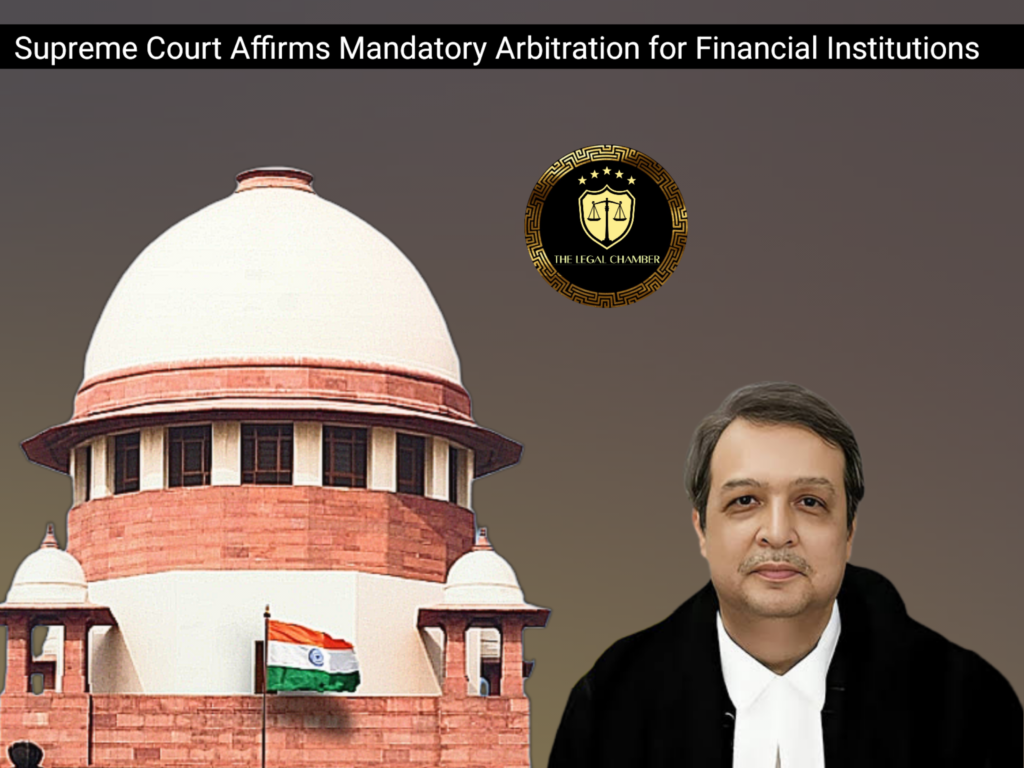
The Supreme Court, in Bank of India vs. M/s Sri Nangli Rice Mills Pvt. Ltd., ruled that Section 11 of the SARFAESI Act is mandatory, requiring inter-se disputes between banks and financial institutions concerning secured assets to be resolved through arbitration. No explicit arbitration agreement is needed; the provision legally mandates it, thereby divesting DRT of jurisdiction in such matters.
Facts Of The Case:
In the case of Bank of India vs. M/s Sri Nangli Rice Mills Pvt. Ltd. & Ors., the core dispute involved the priority of charge over secured assets (stocks of paddy and rice) belonging to a common borrower, M/s Sri Nangli Rice Mills Pvt. Ltd., between two public sector banks: Bank of India (appellant) and Punjab National Bank (respondent). Both banks had extended credit facilities to the borrower and held security interests over the same current assets The conflict arose when both banks initiated proceedings under the SARFAESI Act to recover their dues, leading to a dispute over which bank had a superior claim to the seized assets. Bank of India contended that Punjab National Bank’s charge was not properly registered or perfected. The matter progressed through various forums, including the Debt Recovery Tribunal (DRT), where the inter-se dispute regarding the priority of charge was deliberated. The High Court eventually directed the banks to resolve their dispute through arbitration in terms of Section 11 of the SARFAESI Act, a decision challenged by the Bank of India before the Supreme Court. The Supreme Court’s judgment centered on the mandatory nature of Section 11 for resolving such inter-bank disputes.
Procedural History:
The procedural history of this case began with Bank of India and Punjab National Bank, both creditors of M/s Sri Nangli Rice Mills Pvt. Ltd., initiating recovery proceedings under the SARFAESI Act due to outstanding dues. A dispute arose between the two banks concerning the priority of charge over the common borrower’s secured assets, specifically stocks of paddy and rice. This inter-se dispute was initially brought before the Debt Recovery Tribunal (DRT) in two rounds of proceedings. Following these proceedings, the matter reached the High Court. The High Court, recognizing the nature of the dispute between the specified financial entities, directed the Bank of India and Punjab National Bank to resolve their differences through arbitration as per Section 11 of the SARFAESI Act. This directive from the High Court became the subject of the appeal before the Supreme Court, which ultimately upheld the High Court’s decision, affirming the mandatory nature of arbitration for such disputes.
READ ALSO : Grounds for Arrest: The Supreme Court’s Latest Verdict on Constitutional Safeguards
Court Observation:
The Supreme Court observed that the core legal issue revolved around whether Section 11 of the SARFAESI Act, which provides for dispute resolution among specified financial entities through conciliation or arbitration, is mandatory. The Court meticulously analyzed the language of Section 11, particularly the use of the word “shall,” concluding that it imposes a binding obligation. A significant observation was that an explicit written agreement to arbitrate is not a prerequisite to invoke Section 11, as the provision itself creates a legal fiction of such an agreement. Crucially, the Court determined that the Debt Recovery Tribunal (DRT) lacks jurisdiction to adjudicate inter-se disputes between banks regarding their claims over secured assets, affirming that such matters fall exclusively within the ambit of arbitration under Section 11 of the SARFAESI Act
Final Decision & Judgement:
The Supreme Court, in its final decision, dismissed the appeal and upheld the High Court’s order, concluding that there was no infirmity in directing the appellant and respondent banks to resolve their dispute through arbitration under Section 11 of the SARFAESI Act. The Court unequivocally held that Section 11 of the SARFAESI Act is mandatory, meaning its mandate for conciliation or arbitration in disputes among specified financial entities cannot be circumvented. It further clarified that no explicit written arbitration agreement is necessary, as the provision itself creates a legal fiction for such an agreement. Therefore, the Supreme Court ruled that the Debt Recovery Tribunal lacks jurisdiction over inter-se disputes between banks concerning secured assets, reinforcing that arbitration is the sole prescribed mechanism for their resolution.
Case Details:
Case Title: BANK OF INDIA VERSUS M/S SRI NANGLI RICE MILLS PVT. LTD. & ORS. CITATION: 2025 INSC 765 Civil Appeal No.:7110 OF 2025 Date Of Judgement: May 23, 2025 Judges/Justice Name: J.B. Pardiwala
Download The Judgement Here